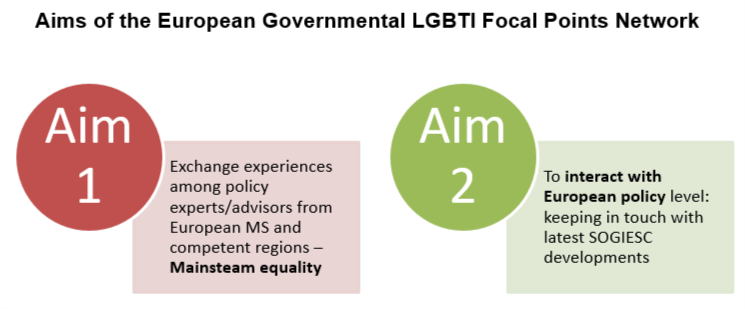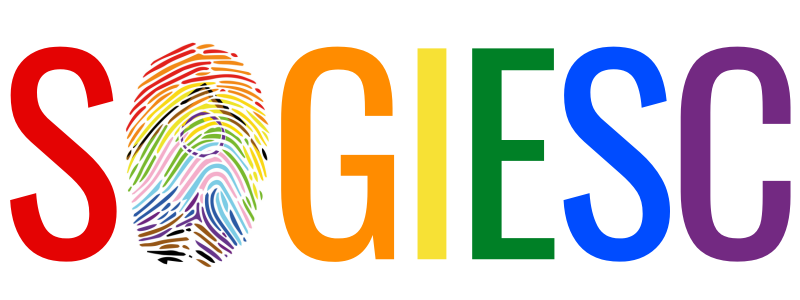European Governmental LGBTI Focal Points Network

The European Governmental LGBTI Focal Points Network (EFPN) is an intergovernmental working group dedicated to the advancement of the human rights of LGBTI persons in the Council of Europe Member States. It was established informally in 2004, with a secretariat based in the Netherlands (Ministry of Education, Culture and Science) that was handed-over to the Council of Europe SOGI Unit in 2020.
Currently, the EFPN has 37 Council of Europe member states and Kosovo* represented by government officials who oversee SOGIESC related matters in their respective countries, and members representing International Organisations, among which the Council of Europe, and INGOs. This is the only European network with a diverse range of stakeholders, including governmental authorities, dedicated specifically to SOGIESC equality.
Main aims:
- To support governmental legal/policy experts in the development of legislation and policies to implement the Council of Europe standards for Sexual Orientation, Gender Identity or Expression and Sex Characteristics (SOGIESC) equality through the exchange of good practice, peer legal and policy reviews and the development of policy texts and tools.
- To interact and build synergies with international organisations and civil society at the European and international levels.

Main tasks:
- Contribute to the periodic review of the implementation of Recommendation CM/Rec(2010)5
- Develop strategies to enhance the implementation of existing Council of Europe standards in relation to SOGIESC and address implementation challenges
- Hold thematic exchanges on trends, emerging human rights issues and evaluate and promote good practice in the member States
- Raise awareness of Council of Europe standards in relation to SOGIESC
The EFPN meets at least twice a year (a roundtable per semester) to share experiences on European laws and policies concerning LGBTI persons and to provide peer-to-peer support for member states to mainstream SOGIESC Equality within their national contexts through policy or legal reform. It supports the Committee on Discrimination and Diversity and Inclusion (CDADI) in implementing relevant tasks of its mandate, in assessing the implementation of the CM/Rec(2010)5 recommendation and advises governments, police authorities, parliamentarians and legislators on possible revision of the standards.

Country Members (38): Albania, Andorra, Austria, Belgium, Bosnia and Herzegovina, Bulgaria, Cyprus, Czech Republic, Denmark, Estonia, Finland, France, Georgia, Germany, Greece, Iceland, Ireland, Italy, Kosovo*, Latvia , Lithuania, Luxemburg, Malta, Moldova, Montenegro, Netherlands, North Macedonia, Norway, Portugal, Romania, Serbia, Slovakia, Slovenia, Spain, Sweden, Switzerland, Ukraine, United Kingdom
European Civil Society Organisations (8)
- European Lesbian* Conference (EL*C)
- European Forum of LGBT Christian Groups
- European LGBTI Police Association (EGPA)
- European Pride Business Network (EPBN)
- ILGA-Europe
- International Lesbian, Gay, Bisexual, Transgender, Queer and Intersex Youth & Student Organisation (IGLYO)
- Organisation Intersex International Europe (OII)
- Rainbow Cities Network
- Transgender Europe (TGEU)
International Organisations (5)
- Council of Europe (SOGI Unit, European Commission against Racism and Intolerance, European Committee of Social Rights, Parliamentary Assembly of the Council of Europe, Congress of Local and Regional Authorities, Commissioner for Human Rights)
- European Union (European Commission DG Justice, DG Equality, European Union Agency for Fundamental Rights (FRA), European External Action Service (EEAS), European Parliament's LGBTI Intergroup)
- Organisation for Economic Co-operation and Development (OECD)
- United Nations (including the United Nations High Commissioner for Human Rights (OHCHR), UNHCR, UNICEF, UNAIDS, UN-Women, ILO and other relevant UN agencies)
- World Bank
*All references to Kosovo, whether the territory, institutions or population, in this text shall be understood in full compliance with United Nations Security Council Resolution 1244 and without prejudice to the status of Kosovo.



